Taking a break from the kids is a reward all parents deserve. If you’ve ever been around kids, you know how demanding they can be. They constantly want your attention 24/7, and when you fail to give it to them, you might unfortunately witness a major meltdown. This parent wants a break from the kids, and thanks to a special get-together, they get to have their wish. However, their friend doesn’t seem to understand. She wants to bring her child to the event at all costs, even though they offered her a free babysitter. More info: Reddit Parents need a night off from their kids, to party and basically be free Image credits: Aleksandr Popov (not the actual photo) The poster wanted a kid-free event; however, one of her friends insisted on bringing her daughter with her Image credits: Kiana Bosman (not the actual photo) Image credits: Kabita Darlami (not the actual photo) The poster offered the friend alternative solutions and even wanted her sitter to look after the little one at her expense, which the mom refused Image credits: u/This_Value_4194 The poster’s friend eventually decided to skip it seeing that the author was not budging on her rule The author’s friends planned a get-together at a restaurant with a private room and bar for her nearly 30th birthday. She and her husband hired a babysitter for their own 3-year-old child and anticipated a night to unwind. However, another friend, Missy, expressed a desire to bring her 5-year-old daughter. The poster offered to compensate her babysitter to accommodate Missy’s daughter as well, but Missy declined, stating her daughter spends all day in daycare and shouldn’t be subjected to additional childcare. The author then politely explained her reservations about having a young child present. She cited concerns about potentially inappropriate language due to the group dynamic and the potential disruption from a restless child who doesn’t sit still or act right at restaurants. The author discussed the situation with the friend who organized the event, and they agreed to request that Missy leave her daughter at home. Missy reacted negatively, refusing to attend the birthday celebration under these circumstances. The author expressed understanding towards Missy, acknowledging similar situations where she has prioritized her child’s needs over attending events. The OP extended an olive branch, offering a separate playdate with both their children to maintain their friendship. Additionally, she clarified that while Missy is welcome at the restaurant, she cannot enter the private room with her daughter. Image credits: Liza Summer (not the actual photo) It’s important to note that the private room rental was a gift from other friends, solidifying the poster’s right to set expectations for the space. This desire for a child-free environment is understandable. As adults, we all crave moments to recharge and reconnect with ourselves. Safe spaces away from kids, like the one created by the private room rental, provide that essential breathing room. These spaces, whether it’s an evening out with friends, a quiet afternoon reading, or even just a solo shower, allow us to shed the responsibilities of caregiving and simply exist as individuals. This is crucial for preventing parental burnout, which can be exacerbated by social isolation. As Child’s Play Early Learning Centre points out, “Parenting can be lonely when you don’t get much time to socialize with other adults.” Not having the chance to talk and open up about the joys and struggles of parenthood can take a toll. When we socialize with other parents, we find a sense of camaraderie by sharing stories and experiences, reminding ourselves we’re not alone in this journey. When you send your children to childcare, you have more opportunities to socialize at work or catch up with valuable family and friends on your days off. You also have time to think about yourself and what you need to do to reach contentment. No one is happy all of the time, but not allocating time to attend to your own wellbeing can lead to feelings of resentment and frustration. This need for self-care and adult socialization extends to social gatherings. Sometimes adults crave time to relax and socialize with friends, potentially engaging in activities or conversations less suitable for children. While some parents might be comfortable bringing their kids to such events, others, like the OP and her friends, might prefer a child-free environment. Missy’s decision not to find alternative childcare ultimately prevented her from attending the celebration as envisioned by the organizer. “People come with all different quirks, idiosyncrasies, and lists of things that annoy the crap out of them, so they’re naturally going to have different boundaries, needs, preferences, and perspectives when it comes to parenting styles.” Kat Vellos, author of We Should Get Together: The Secret to Cultivating Better Friendships shared with Bored Panda. There’s a difference between boundaries and preferences. If you and your friend are working together to navigate each other’s preferences, it’s going to be easier to compromise and flex so you can find common ground. But if one person states a firm boundary or requirement, that’s different. Attempting to push them past a firm boundary that they’ve already made clear is a good way to damage your friendship permanently. On the issue of compromise, Kat noted that the author offered two compromises—she offered to pay the sitter extra money to also watch Missy’s daughter. The author also suggested that they have a lunchtime playdate together with both of their kids to celebrate at another time. She made it as logistically easy as possible for Missy to either attend the adult party or accept a reasonable alternative. Missy wouldn’t lose any cash if she came to the adult party since she wouldn’t have to pay for a sitter and she didn’t contribute to the cost of the private room rental. All she had to do was show up and celebrate her friend’s birthday — either with the grownups at night, or later at a lunch with the kids. Instead, she disinvited herself from both options. Missy could definitely have been more understanding of the request for a child-free event. This was her friend’s birthday party after all, and this friend offered to pay for a sitter for both of their children, demonstrating that she wanted Missy there. On someone’s birthday, they are the one who gets to call the shots, period. They have every right to say: “no kids” or “no dogs” or “no shoes in the house” or “no alcohol” or “no Nickelback” or whatever. As their friend, the most awesome thing you can do is to help them have that kid-free, dog-free, Nickelback-free, sober shindig. Or, you can kindly decline to attend. If someone wants a child-free gathering, not just on their birthday but any day of the year, they have every right to say so. Sometimes that means their parent-friends can attend, and sometimes that means their parent-friends can’t attend. In declaring that boundary, they’re making it clear that whether you can make it or not, they’re willing to accept any outcome. Too bad she missed out on it even though she didn’t need to. Anyway, what do you think about this debacle? Was the OP’s reaction justified? Let’s hear from you in the comments. Commenters agreed the poster was not the jerk seeing that she offered multiple solutions The post “[Am I The Jerk] For Telling My Friend She Can’t Come If She Brings Her Kid” first appeared on Bored Panda.“[Am I The Jerk] For Telling My Friend She Can’t Come If She Brings Her Kid”
Taking a break from the kids is a reward all parents deserve. If you’ve ever been around kids, you know how demanding they can be. They constantly want your attention 24/7, and when you fail to give it to them, you might unfortunately witness a major meltdown.
This parent wants a break from the kids, and thanks to a special get-together, they get to have their wish. However, their friend doesn’t seem to understand. She wants to bring her child to the event at all costs, even though they offered her a free babysitter.
More info: Reddit
Parents need a night off from their kids, to party and basically be free

Image credits: Aleksandr Popov (not the actual photo)
The poster wanted a kid-free event; however, one of her friends insisted on bringing her daughter with her
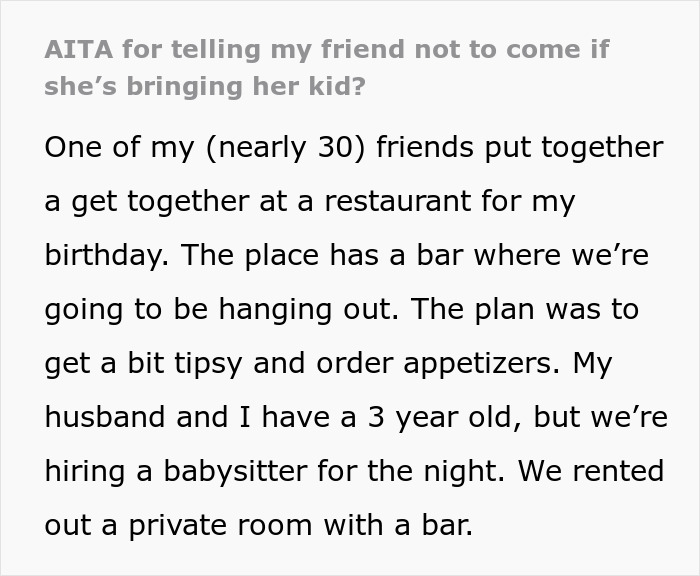
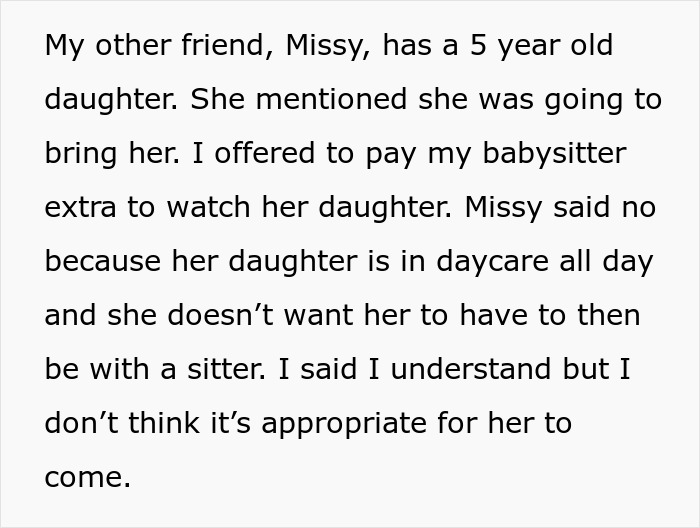

Image credits: Kiana Bosman (not the actual photo)
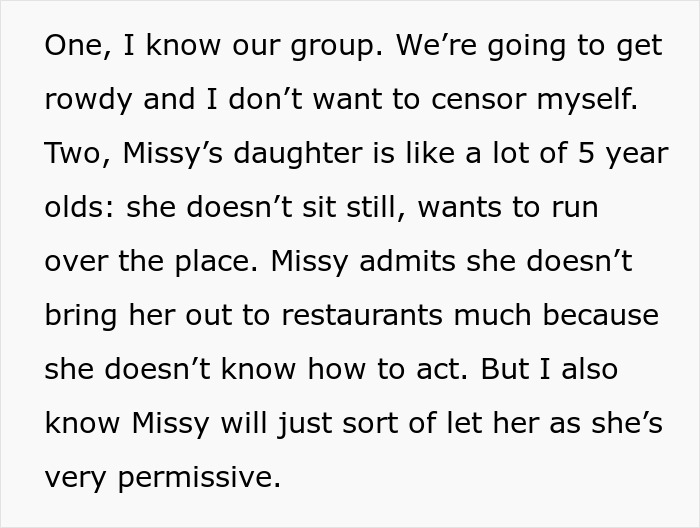
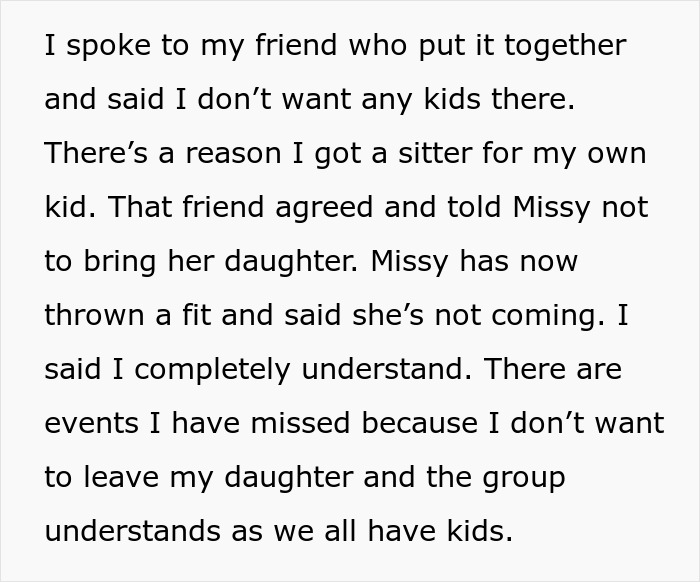

Image credits: Kabita Darlami (not the actual photo)
The poster offered the friend alternative solutions and even wanted her sitter to look after the little one at her expense, which the mom refused
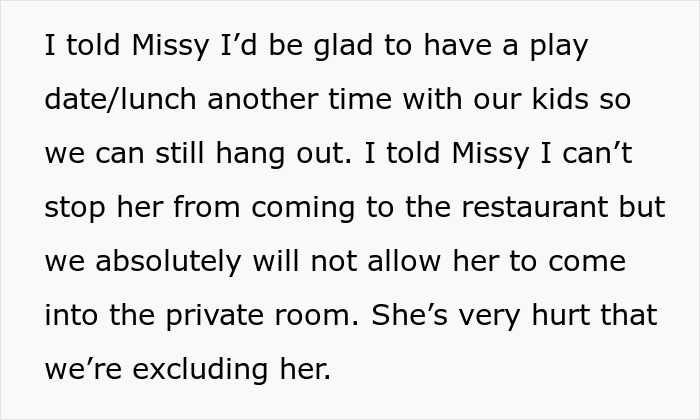

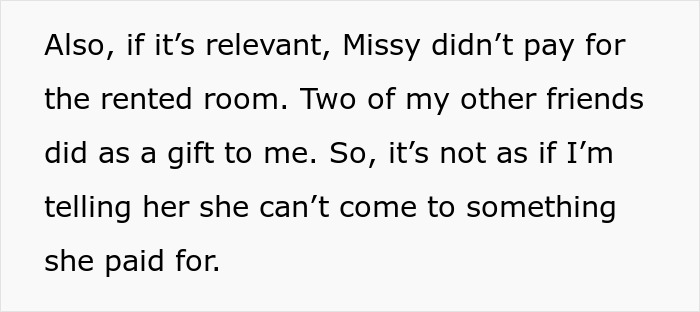
Image credits: u/This_Value_4194
The poster’s friend eventually decided to skip it seeing that the author was not budging on her rule
The author’s friends planned a get-together at a restaurant with a private room and bar for her nearly 30th birthday. She and her husband hired a babysitter for their own 3-year-old child and anticipated a night to unwind. However, another friend, Missy, expressed a desire to bring her 5-year-old daughter.
The poster offered to compensate her babysitter to accommodate Missy’s daughter as well, but Missy declined, stating her daughter spends all day in daycare and shouldn’t be subjected to additional childcare. The author then politely explained her reservations about having a young child present. She cited concerns about potentially inappropriate language due to the group dynamic and the potential disruption from a restless child who doesn’t sit still or act right at restaurants.
The author discussed the situation with the friend who organized the event, and they agreed to request that Missy leave her daughter at home. Missy reacted negatively, refusing to attend the birthday celebration under these circumstances. The author expressed understanding towards Missy, acknowledging similar situations where she has prioritized her child’s needs over attending events. The OP extended an olive branch, offering a separate playdate with both their children to maintain their friendship. Additionally, she clarified that while Missy is welcome at the restaurant, she cannot enter the private room with her daughter.

Image credits: Liza Summer (not the actual photo)
It’s important to note that the private room rental was a gift from other friends, solidifying the poster’s right to set expectations for the space. This desire for a child-free environment is understandable. As adults, we all crave moments to recharge and reconnect with ourselves. Safe spaces away from kids, like the one created by the private room rental, provide that essential breathing room.
These spaces, whether it’s an evening out with friends, a quiet afternoon reading, or even just a solo shower, allow us to shed the responsibilities of caregiving and simply exist as individuals. This is crucial for preventing parental burnout, which can be exacerbated by social isolation. As Child’s Play Early Learning Centre points out, “Parenting can be lonely when you don’t get much time to socialize with other adults.” Not having the chance to talk and open up about the joys and struggles of parenthood can take a toll. When we socialize with other parents, we find a sense of camaraderie by sharing stories and experiences, reminding ourselves we’re not alone in this journey.
When you send your children to childcare, you have more opportunities to socialize at work or catch up with valuable family and friends on your days off. You also have time to think about yourself and what you need to do to reach contentment. No one is happy all of the time, but not allocating time to attend to your own wellbeing can lead to feelings of resentment and frustration.
This need for self-care and adult socialization extends to social gatherings. Sometimes adults crave time to relax and socialize with friends, potentially engaging in activities or conversations less suitable for children. While some parents might be comfortable bringing their kids to such events, others, like the OP and her friends, might prefer a child-free environment. Missy’s decision not to find alternative childcare ultimately prevented her from attending the celebration as envisioned by the organizer.
“People come with all different quirks, idiosyncrasies, and lists of things that annoy the crap out of them, so they’re naturally going to have different boundaries, needs, preferences, and perspectives when it comes to parenting styles.” Kat Vellos, author of We Should Get Together: The Secret to Cultivating Better Friendships shared with Bored Panda.
There’s a difference between boundaries and preferences. If you and your friend are working together to navigate each other’s preferences, it’s going to be easier to compromise and flex so you can find common ground. But if one person states a firm boundary or requirement, that’s different. Attempting to push them past a firm boundary that they’ve already made clear is a good way to damage your friendship permanently.
On the issue of compromise, Kat noted that the author offered two compromises—she offered to pay the sitter extra money to also watch Missy’s daughter. The author also suggested that they have a lunchtime playdate together with both of their kids to celebrate at another time. She made it as logistically easy as possible for Missy to either attend the adult party or accept a reasonable alternative. Missy wouldn’t lose any cash if she came to the adult party since she wouldn’t have to pay for a sitter and she didn’t contribute to the cost of the private room rental. All she had to do was show up and celebrate her friend’s birthday — either with the grownups at night, or later at a lunch with the kids. Instead, she disinvited herself from both options.
Missy could definitely have been more understanding of the request for a child-free event. This was her friend’s birthday party after all, and this friend offered to pay for a sitter for both of their children, demonstrating that she wanted Missy there.
On someone’s birthday, they are the one who gets to call the shots, period. They have every right to say: “no kids” or “no dogs” or “no shoes in the house” or “no alcohol” or “no Nickelback” or whatever. As their friend, the most awesome thing you can do is to help them have that kid-free, dog-free, Nickelback-free, sober shindig. Or, you can kindly decline to attend.
If someone wants a child-free gathering, not just on their birthday but any day of the year, they have every right to say so. Sometimes that means their parent-friends can attend, and sometimes that means their parent-friends can’t attend. In declaring that boundary, they’re making it clear that whether you can make it or not, they’re willing to accept any outcome.
Too bad she missed out on it even though she didn’t need to. Anyway, what do you think about this debacle? Was the OP’s reaction justified? Let’s hear from you in the comments.
Commenters agreed the poster was not the jerk seeing that she offered multiple solutions
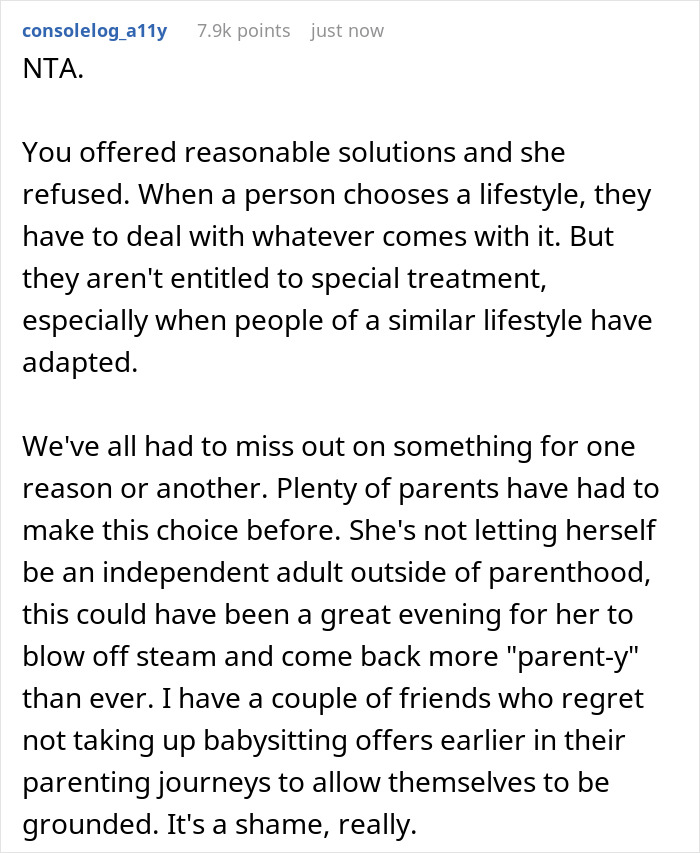

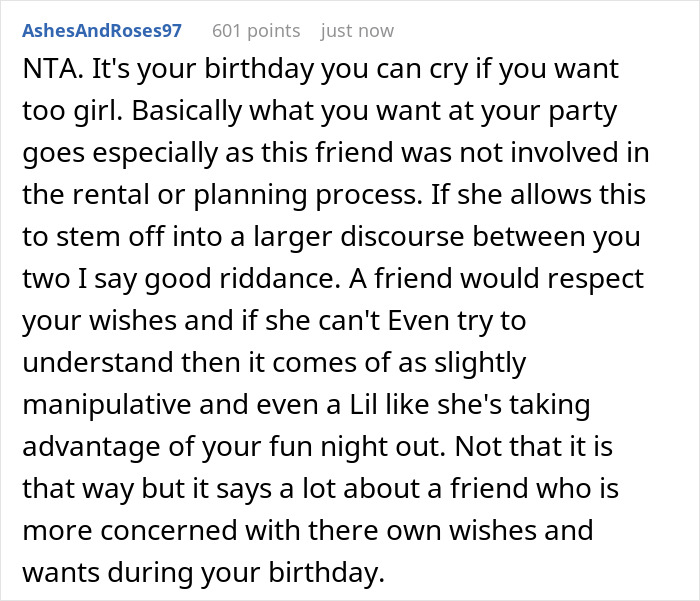
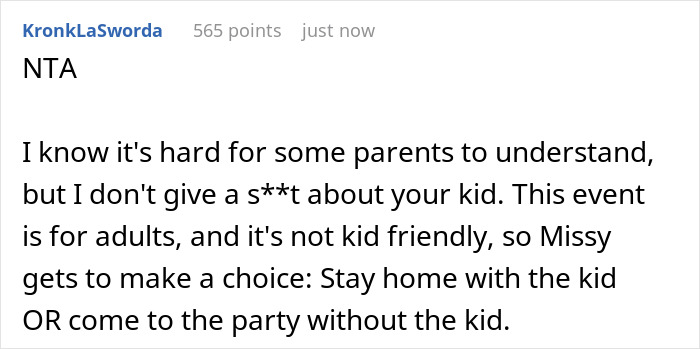
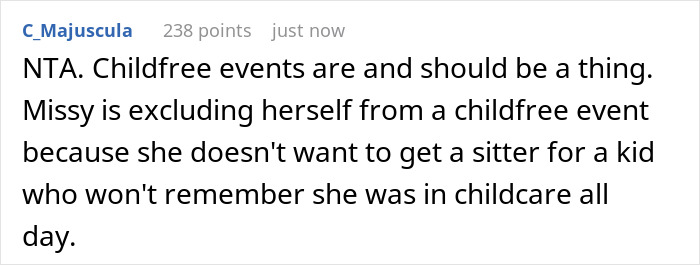

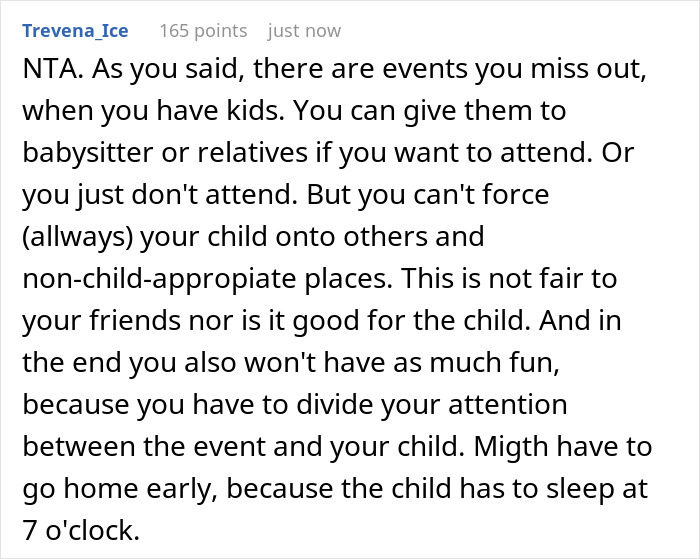
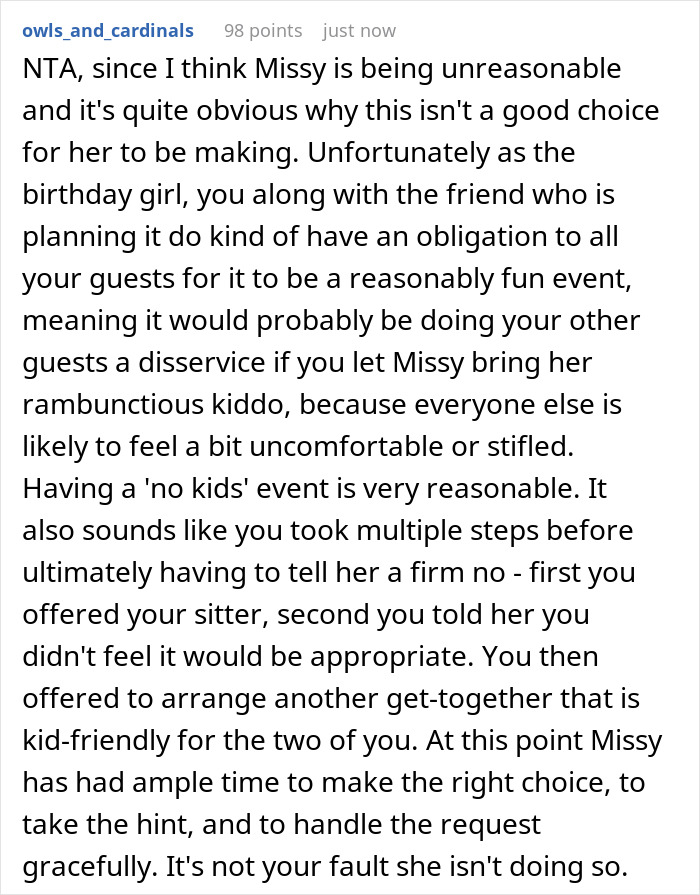




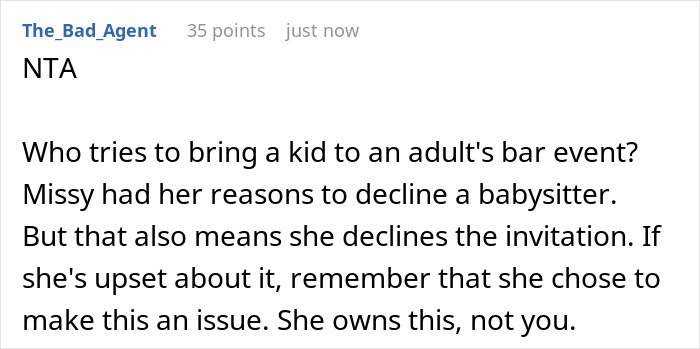

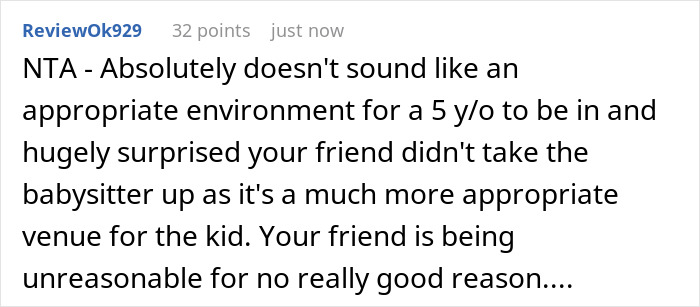
from Bored Panda https://ift.tt/YLN6yhx




No comments: